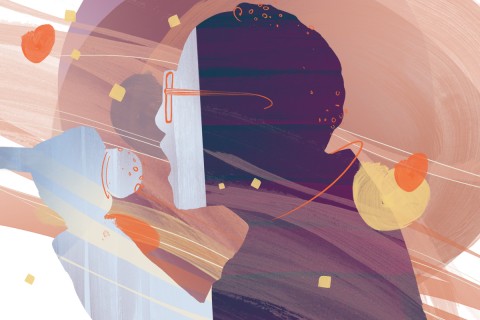Pride and Prejudice in a Speedo
Mr. Malcolm’s List and Bridgerton offer flimsy historical fantasy. Fire Island goes deeper.

Every generation deserves its own adaptation of Pride and Prejudice, and Gen Z got a gem in Fire Island (directed by Andrew Ahn, streaming on Hulu), which reinterprets Jane Austen’s masterpiece set on the New York island known as a haven for queer culture. There is a definite leap from the carefully arranged heterosexual marriages of Austen’s world to casual vacation sex (and there is a lot of explicit sex, and talk about sex, so this adaptation is probably not for the whole family), but the tensions the film explores between desire and social constraints and the quest for something real amid superficiality and display come straight from Austen’s playbook.
Best friends Noah (Joel Kim Booster, who also wrote the screenplay) and Howie (Bowen Yang) stand in for sisters Elizabeth and Jane Bennet. Howie finds the hookup culture of Fire Island toxic and depressing. He is seeking, if not true love, at least mutual attraction and respect, and Noah agrees to help him find it before their vacation is over. Sparks fly when they meet Charlie (James Scully), a kind, gentle doctor. But Charlie’s friends, Will (Conrad Ricamora), our tight-lipped Mr. Darcy, and their entourage—wealthier, fitter, insufferably snobby—find Noah and Howie’s crew distastefully flamboyant and crass. Noah’s pride and Will’s prejudice launch the roller coaster enemies-to-lovers plot, which parallels Charlie and Howie’s halting romance and intersects with some side stories about rakish ex-lovers and drunken foolish friends.
Like the Bennet sisters, Noah and Howie are more serious than their other “sisters,” the self-involved, party-loving best friends they consider family. As Asian-American men they are much more guarded around the people who, in Noah’s words, “think you have to be successful, White, and rich with 7 percent body fat to vacation on Fire Island.” They both know that, for all their talk of liberation from the status quo, gay male subcultures perpetuate their own class and race hierarchies. Like a good Austen narrator laying out the rules of the marriage market in Regency England, Noah breaks down the many ways the men on Fire Island will judge each other: money and property value for sure, “but also race, masculinity, abs . . . just a few of the metrics we use to separate ourselves into upper and lower classes.” And like good Austen heroines, Noah and Howie must find a way to navigate this social minefield without losing the values that define them.




